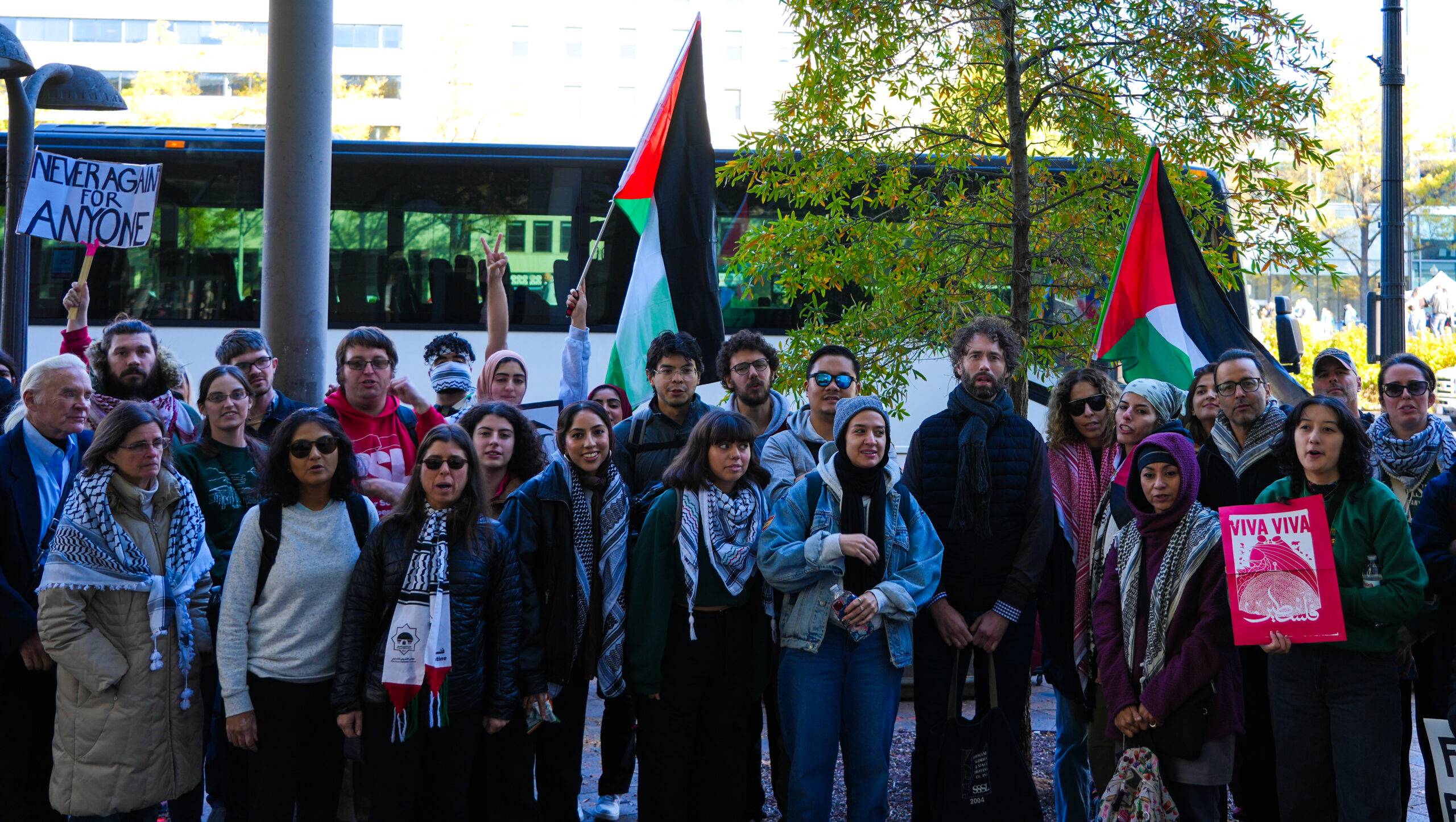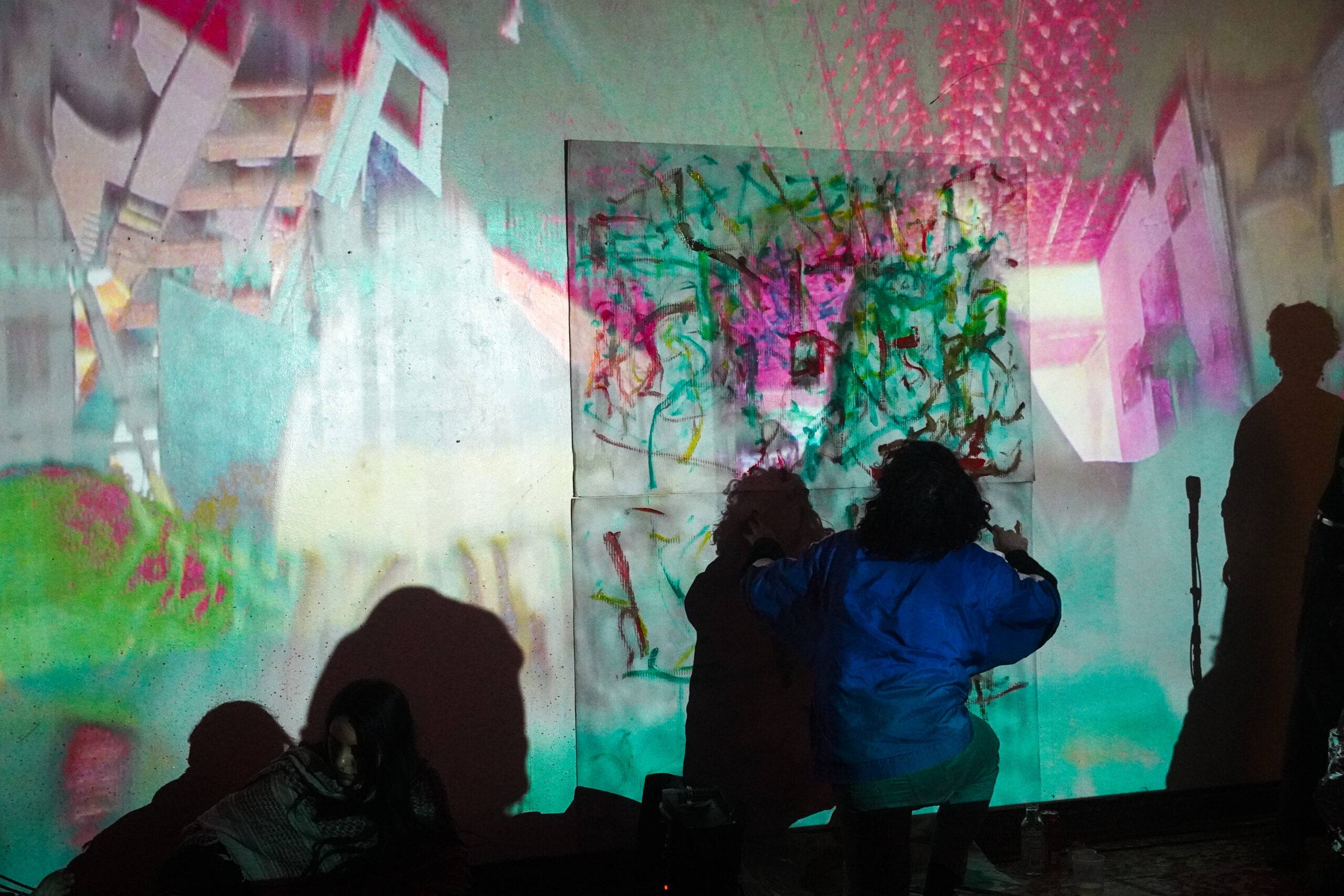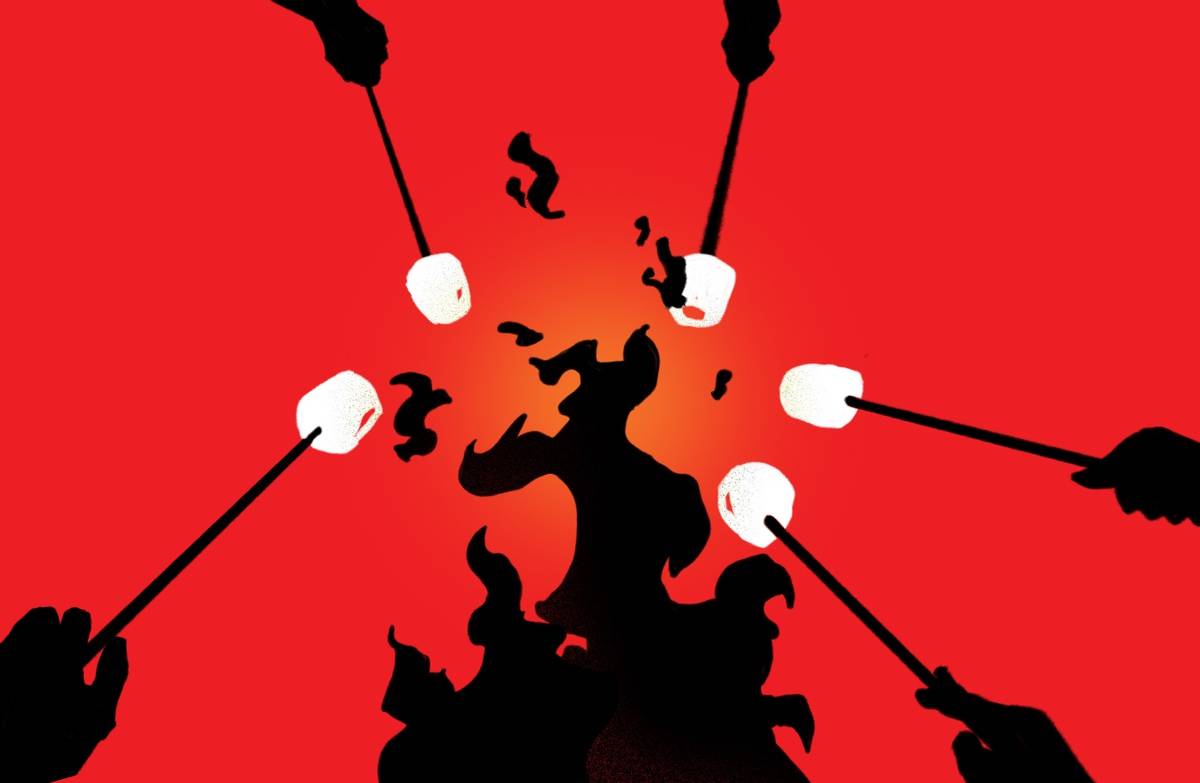
It was dark, and most of the passengers were asleep. It wasn’t a comfortable place to rest, but they had to, because tomorrow, Nov. 4, would be a big day for everyone.
“Tomorrow we will be auditioning for sympathy,” said Noura Hossini, a Palestinian-American riding the bus to Washington, D.C.. Hossini, like the rest of the passengers, was gearing up to take part in one of the biggest pro-Palestine protests this county has ever seen.
The moment we entered the bus the driver turned off the lights leaving most of the bus in darkness, so when Hossini spoke, only part of her face was illuminated by the fluorescent book light above her.
Hossini moved to the U.S. for college in 2011. Displacement, for her, had been a constant. Born in the U.S. to Palestinian parents, Hossini’s family lived in Jerusalem when she was a child, and shifted to Ramallah in the West Bank when she was in high school. The two places, only 30 minutes away from each other, were separated by the Qalandia checkpoint, manned by the Israeli military.
“It makes it very, very challenging to move between cities. So even though I grew up in Jerusalem, I probably went there maybe less than a handful of times since I moved, because you need a permit to go from the West Bank to the Israeli occupied territories,” she said.
Hossini spoke of her past as an orator. She was incredibly rehearsed, striking emphasis on the right points and pauses for maximum effect.
Hossini’s parents currently live in Ramallah (in the West Bank), her maternal family lives in Nablus (also in the West Bank), and her paternal family lives in Jerusalem. Their displacement from Jerusalem to Ramallah was something forced upon them through laws mandated by the occupation of Jerusalem.
“My dad moved to the U.S. for school, and wasn’t able to renew his blue ID, which is the Israeli ID. And when he tried to do so, it took him 15 years, and he still wasn’t able to get it in the courts. And that’s why we had to move from Jerusalem to the West Bank,” Hossini said.
Back in Jerusalem, Hossini’s family celebrated Friday dinner together. Her family hosted 30 people every week on Fridays, and she described it as her community and culture. It’s one of the things she misses most about home.
She lamented about the yearn for community, and how it contradicted her introvertedness.
“I’m in America, and I don’t have to be worried about what I say on the phone unlike my mom, but I miss my home and my family, and I’m going to D.C. because for all the freedom of movement in America, I miss my home and family,” Hossini said.
For Hossini, the protest in D.C. would be the biggest stage for something she’d been doing her whole life. And this time, she was doing it with two of her brothers who were making the trip with her.
“While Palestinians are being murdered and slaughtered, I have to keep telling people like, ‘No, we’re not monsters. We’re not anti-Semitic.’ There’s a genocide happening, and I have to keep telling people this, despite having already said it many, many times,” Hossini said.
The Palestinian struggle is layers upon layers of torment, according to Hossini. Those who have been able to stay in their land live under systemic oppression and have grown used to people dying in tens everyday. The ones who live abroad are constantly attempting to humanize themselves.
“Why do I have to do this dance for you to care about the Palestinian cause? Every single Palestinian has to always tiptoe and audition for people’s sympathy, and I’m so tired of that,” Hossini said.
For Hossini, the protest in D.C. was reminiscent of the 1963 March on Washington, where Martin Luther King, Jr. made his “I Have A Dream” speech.
“I feel like that’s what drove me to want to be there to be with everyone under one sky, to make waves and make people listen coming from all parts of the US. Standing there, screaming the same thing, I want to feel united for one cause,” said Hossini
Palestinians Don’t Fear Death
“Why am I going to D.C.? I’m going to DC to fight for my home I’ve never seen. And I’m 44 years old,” said Faten Alyen.
Faten Alyan and Fatima Alyan, two sisters sitting together on the thirteenth row in the bus, had woken up at 5 a.m. when the bus made a pit stop outside Maryland, and it was hard for them to drift off to sleep again as the journey continued, knowing that they’d be in D.C. in fewer than three hours.
Faten Alyan and Fatima Alyan insisted on the camera keeping both of them in the same frame instead of breaking the interviews up. Palestinian stories, they said, were similar enough across families that they started to lose impact. It was better if their story was told together.
The story of their family followed the same narrative as that of many other Palestinian refugees. Their grandparents were among the first to face dispossession in the Nakba of 1948, and now they were the third generation refugees-turned-immigrants.
As a Pakistani, imperialism breaking up homelands was not a foreign concept to me either. Though it was hard for me to say this to them knowing that my struggle was that of my grandparents and theirs was ongoing.
“Ironically enough, I took the same journey over two decades ago. And I had two young kids at the time, and I remember getting on the bus with my husband, a small group of people, and taking this same overnight journey to DC in March. Here I am, like, two decades later,” said Faten Alyan.
For 25 years, Faten Alyan has been marching in the streets calling for the liberation of Palestine.
According to Faten Alyan, it’s different this time around. She’s compared the numbers, the people in the audience advocating for Palestine, and the knowledge people have in 2023 with each other. She said she thought D.C. was a possible turning point for the Palestinian struggle.
Even so, Faten Alyan was unsure about going to D.C. for the Nov. 4 March. She said it was because of security reasons — not the police or danger of arrests — because just the weekend before, her daughter and her had almost been assaulted at a march in Chicago.
“It took me a long time to decide to go to D.C. It was more because of safety concerns — the shooter at the Chicago rally really scared me. But, I made the decision to go on Wednesday. There are some things you just can’t stay silent about. It makes you complicit,” said Faten Alyan. (On Oct.28, a man fired a short in Skokie during a pro-Palestinian protest; another man attacked the demonstrator with pepper-spray).
I nodded along. She had encapsulated the fears and justifications every international student I had spoken to had shared with me.
Fatima, Faten’s sister who had been silent for most of this conversation, spoke up now to disagree with her sister.
“Death wasn’t a fear for me. I don’t fear death. I’m a Palestinian. We’re the voice for the voiceless and if I die marching, then I die marching,” said Fatima Alyan.
For Faten Alyan, going to protests has never been a thing to debate. For her, going to D.C. was another step to end American hypocrisy. She was tired of being portrayed as a benefactor of America’s goodwill.
“They talk about taking us in, but they neglect the simple fact that our ancestors didn’t migrate here willingly. They were happily living in their country, in their homeland, in their villages. And then foreign nations came in and destroyed their country. And then the same nations and countries that destroyed their country tried to put on like the Superman cape. We don’t need your goodwill, you’re the reason our people are dying,” said Faten Alyan.
Faten Alyan said the expected turnout in D.C. was hope for her that the time to go home was near.
“We will all willingly go back to our country, but you need to give Israel half your country, just like you [white people] decided to give Israel our country and take your blood money with you. We won’t even pack our bags. We will pick ourselves up and leave,” said Faten Alyan.
From Little Palestine to Palestine
M, a Palestinian, is from what used to be called Little Palestine in Chicago. (F Newsmagazine is using only her first initial to protect her privacy.)
“Before Little Palestine, I lived in Nablus in the West Bank. Before that, my family lived in the Jenin refugee camp. I don’t know what to say when people ask me where I’m from. No, I’m not from Chicago, I’m from Palestine,” said M.
M laughed when she talked about how the neighborhood in Chicago, near 87th Street and Harlem Avenue was renamed and the name Little Palestine was removed. She compared it to the erasure Palestinians have seen their entire lives.
“Half my memory of Palestine is sitting in a car going from Nablus to Jerusalem, spending hours in the car because the colonizing military won’t even let us visit our own homes,” she said. “I’m a foreigner on a student visa in America and I don’t need to show any ID when I’m going from one state to the other but they want me to shut up when I can’t even go home? Fuck, No.”
M said she was going to D.C. because she doesn’t have a lot of time. She’s an international student and she only has a few years before she has to leave the U.S. and she intends to do as much as she can.
“Deportation? Why would I be scared of that? No, I want to go home. I don’t want to stay here. Go ahead, send me home, but until I’m here, my body is going to be in every place Palestine needs it to be. Palestinians get used to fear.”
For M, going to D.C. was as necessary as telling her story.
“I march to keep Gaza’s name alive. Israel is a failed colonial project and the U.S. will do anything to prevent it from collapsing. I have a connection to this land, if Palestine dies, I die and I cannot see it go,” M said.
“I’m seeing people get desensitized to Palestinian deaths. They can’t do that. Only Palestinians can because they have to. Palestinians die a lot, like, oh, two people died in Nablus yesterday. Sure. And you move on. You get used to arrests a lot. Oh, he was in prison for 15 years, and he just. But if you don’t live there, and you know you’re not next to die, then you don’t get to be desensitized,” M said.







